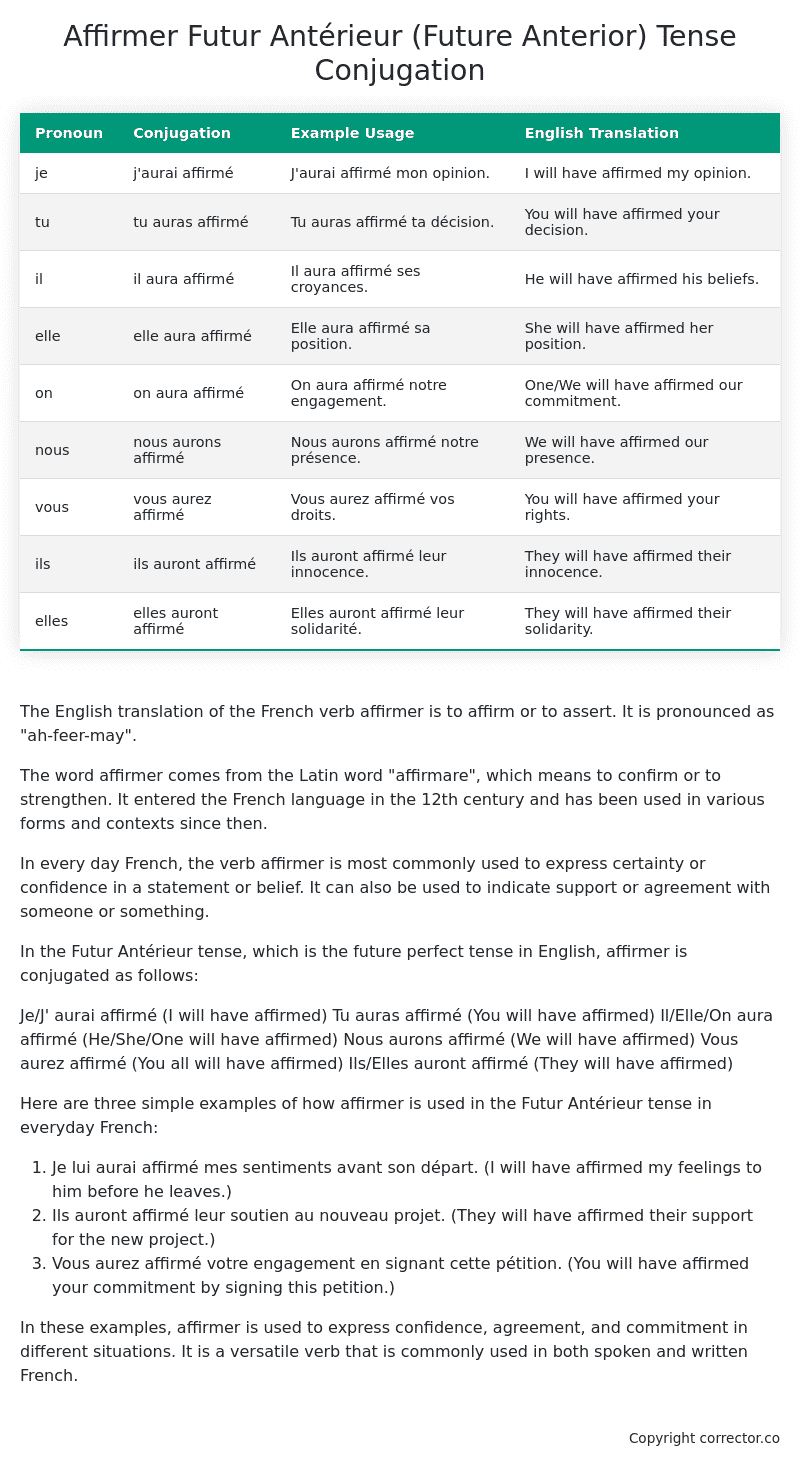Futur Antérieur (Future Anterior) Tense Conjugation of the French Verb affirmer
Introduction to the verb affirmer
The English translation of the French verb affirmer is to affirm or to assert. It is pronounced as “ah-feer-may”.
The word affirmer comes from the Latin word “affirmare”, which means to confirm or to strengthen. It entered the French language in the 12th century and has been used in various forms and contexts since then.
In every day French, the verb affirmer is most commonly used to express certainty or confidence in a statement or belief. It can also be used to indicate support or agreement with someone or something.
In the Futur Antérieur tense, which is the future perfect tense in English, affirmer is conjugated as follows:
Je/J’ aurai affirmé (I will have affirmed)
Tu auras affirmé (You will have affirmed)
Il/Elle/On aura affirmé (He/She/One will have affirmed)
Nous aurons affirmé (We will have affirmed)
Vous aurez affirmé (You all will have affirmed)
Ils/Elles auront affirmé (They will have affirmed)
Here are three simple examples of how affirmer is used in the Futur Antérieur tense in everyday French:
- Je lui aurai affirmé mes sentiments avant son départ. (I will have affirmed my feelings to him before he leaves.)
- Ils auront affirmé leur soutien au nouveau projet. (They will have affirmed their support for the new project.)
- Vous aurez affirmé votre engagement en signant cette pétition. (You will have affirmed your commitment by signing this petition.)
In these examples, affirmer is used to express confidence, agreement, and commitment in different situations. It is a versatile verb that is commonly used in both spoken and written French.
Table of the Futur Antérieur (Future Anterior) Tense Conjugation of affirmer
| Pronoun | Conjugation | Example Usage | English Translation |
|---|---|---|---|
| je | j’aurai affirmé | J’aurai affirmé mon opinion. | I will have affirmed my opinion. |
| tu | tu auras affirmé | Tu auras affirmé ta décision. | You will have affirmed your decision. |
| il | il aura affirmé | Il aura affirmé ses croyances. | He will have affirmed his beliefs. |
| elle | elle aura affirmé | Elle aura affirmé sa position. | She will have affirmed her position. |
| on | on aura affirmé | On aura affirmé notre engagement. | One/We will have affirmed our commitment. |
| nous | nous aurons affirmé | Nous aurons affirmé notre présence. | We will have affirmed our presence. |
| vous | vous aurez affirmé | Vous aurez affirmé vos droits. | You will have affirmed your rights. |
| ils | ils auront affirmé | Ils auront affirmé leur innocence. | They will have affirmed their innocence. |
| elles | elles auront affirmé | Elles auront affirmé leur solidarité. | They will have affirmed their solidarity. |
Other Conjugations for Affirmer.
Le Present (Present Tense) Conjugation of the French Verb affirmer
Imparfait (Imperfect) Tense Conjugation of the French Verb affirmer
Passé Simple (Simple Past) Tense Conjugation of the French Verb affirmer
Passé Composé (Present Perfect) Tense Conjugation of the French Verb affirmer
Futur Simple (Simple Future) Tense Conjugation of the French Verb affirmer
Futur Proche (Near Future) Tense Conjugation of the French Verb affirmer
Plus-que-parfait (Pluperfect) Tense Conjugation of the French Verb affirmer
Passé Antérieur (Past Anterior) Tense Conjugation of the French Verb affirmer
Futur Antérieur (Future Anterior) Tense Conjugation of the French Verb affirmer (this article)
Subjonctif Présent (Subjunctive Present) Tense Conjugation of the French Verb affirmer
Subjonctif Passé (Subjunctive Past) Tense Conjugation of the French Verb affirmer
Subjonctif Imparfait (Subjunctive Imperfect) Tense Conjugation of the French Verb affirmer
Subjonctif Plus-que-parfait (Subjunctive Pluperfect) Tense Conjugation of the French Verb affirmer
Conditionnel Présent (Conditional Present) Tense Conjugation of the French Verb affirmer
Conditionnel Passé (Conditional Past) Tense Conjugation of the French Verb affirmer
L’impératif Présent (Imperative Present) Tense Conjugation of the French Verb affirmer
L’infinitif Présent (Infinitive Present) Tense Conjugation of the French Verb affirmer
Struggling with French verbs or the language in general? Why not use our free French Grammar Checker – no registration required!
Get a FREE Download Study Sheet of this Conjugation 🔥
Simply right click the image below, click “save image” and get your free reference for the affirmer Futur Antérieur tense conjugation!

Affirmer – About the French Futur Antérieur (Future Anterior) Tense
Construction
Common Everyday Usage Patterns
Interactions with Other Tenses
For example
Summary
I hope you enjoyed this article on the verb affirmer. Still in a learning mood? Check out another TOTALLY random French verb conjugation!


